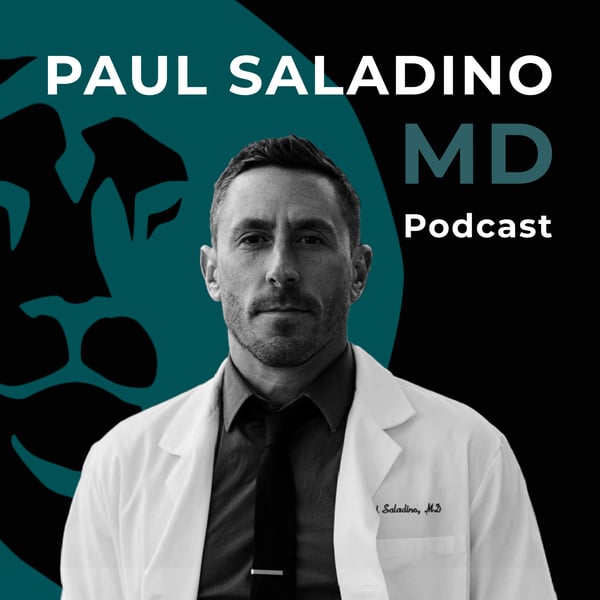Controversial Thoughts: Animal Fats Prevent Cancer?!
Paul Saladino MD podcast
Paul Saladino, MD
4.8 • 2.7K Ratings
🗓️ 2 October 2020
⏱️ 9 minutes
🧾️ Download transcript
Summary
In case you needed more reasons to love Suet (and tallow) allow me to share with you a few more studies showing some really cool benefits including colon cancer prevention in animal models, and odd chain fatty acids like C:15 (pentadecanoic acid) which appear to have significant health benefits that are found only in animal foods! Nose to tail for the win yet again!
Welcome to The Remembering...
Check us out at Heart & Soil (www.heartandsoil.co) if you need more nose to tail nutrition in your life!
Transcript
Click on a timestamp to play from that location
| 0:00.0 | What is up you guys? Welcome to another edition of controversial thoughts. These are my favorite things to do now. It seems like everybody likes them. |
| 0:06.0 | So stoked about them so I will keep doing them. |
| 0:09.0 | I'm also super stoked about what we're doing at Heart and Swile. We got blood builder and histamine coming out in histamine and immune coming out in a week and a half in addition to fire starter, got a digestion and beef organs. |
| 0:19.0 | And I came across some amazing papers as I was researching beef tallow that I want to share with you guys if you had any doubts about the magic of animal fats behold. |
| 0:30.0 | There is so much cool stuff here. I'm going to try and make this one shorter because I always talk a long time. I'm going to try and make this a short controversial thoughts. Here we go. |
| 0:39.0 | Beef tallow increases apoptosis or apoptosis depending how you say it. And decreases aberrant cryptosy formation relative to soybean oil in the rat colon. In this study in rats, they gave rats cancer by giving them di-methylhydrousine and they fed them either k-cine, which is a milk protein or beef protein. |
| 0:58.0 | And soybean oil versus tallow in a two by two factorial design for nine weeks. And the thing is that they're inducing cancers with di-methylhydrousine. What fared the best? |
| 1:08.0 | The k-cine versus beef protein didn't have much of a difference suggesting meat doesn't cause or worse in colon cancer number one. |
| 1:15.0 | But the real exciting part of the study was that beef tallow reduced the number of aberrant cryptosy and decreased fecal bile acid concentrations and increased new coastal apoptosis with tallow consumption. |
| 1:27.0 | And these are not consistent with a role for this fat and increasing the risk of colon cancer. Soybean oil fared worse. So in rats fed soybean oil, they had more aberrant cryptosy, which are precancerous lesions. |
| 1:38.0 | Tallow was protected. Get your animal fat in your diet. That's why we made fire starter. If it's easier for you guys, get your animal fat in your diet. |
| 1:45.0 | This is a really cool interventional study, which is often ignored when people are told that meat or animal fat causes cancer that shows that meat and animal fat prevents it or improves outcomes. |
| 1:56.0 | Do not sleep on this really cool stuff. |
| 1:59.0 | I want to show you another thing that I've been thinking about recently. If you listen to the podcast with Ben Beakman, Ben Bickman. |
| 2:07.0 | Sorry, Ben, I missed your name. |
| 2:10.0 | We talked about a dipacite hypertrophy and how the centerpiece of metabolic dysfunction appears to be the fact that our dipacites cannot divide that they get stuck and they over expand. |
| 2:20.0 | They're like that barook assault on really one kind of chocolate factory chocolate factory. She just blows up in a huge blueberry and then she explodes. |
| 2:28.0 | That's the problem with our fat cells and metabolic dysfunction when they get super big, they get extended. They get inflamed and it's problematic because they can't divide. If you have a dipacite hyperplasia, which is a dipacite division, you can prevent metabolic dysfunction. |
| 2:41.0 | You can be fat but metabolically healthy if you have lots of smaller deposits. If you're fat and you have lots of big atypocytes, then you are metabolically unwell. They release inflammatory markers, they release excess free fatty acids, and insulin resistance that is metabolic dysfunction ensues. |
| 2:55.0 | Now I do a dipacite sometimes get broken in their cell division mechanisms. A lot of it has to do with p-pargama signaling and things that inhibit p-pargama signaling. |
| 3:04.0 | If you listen to the podcast with Ben Bickman, that is all a dean diones, things like the medications piled glitazone and actose are signals for p-pargama. They trigger our dipacites to divide. |
| 3:20.0 | They fix the problem but they're triggering broken adipocytes that won't divide to divide and they prevent metabolic dysfunction. But you're getting fatter because you're getting more dipocytes. Why is it that a dipacite sometimes become hypertrophic, to standard like verucosalt instead of dividing? |
... |
Please login to see the full transcript.
Disclaimer: The podcast and artwork embedded on this page are from Paul Saladino, MD, and are the property of its owner and not affiliated with or endorsed by Tapesearch.
Generated transcripts are the property of Paul Saladino, MD and are distributed freely under the Fair Use doctrine. Transcripts generated by Tapesearch are not guaranteed to be accurate.
Copyright © Tapesearch 2025.

